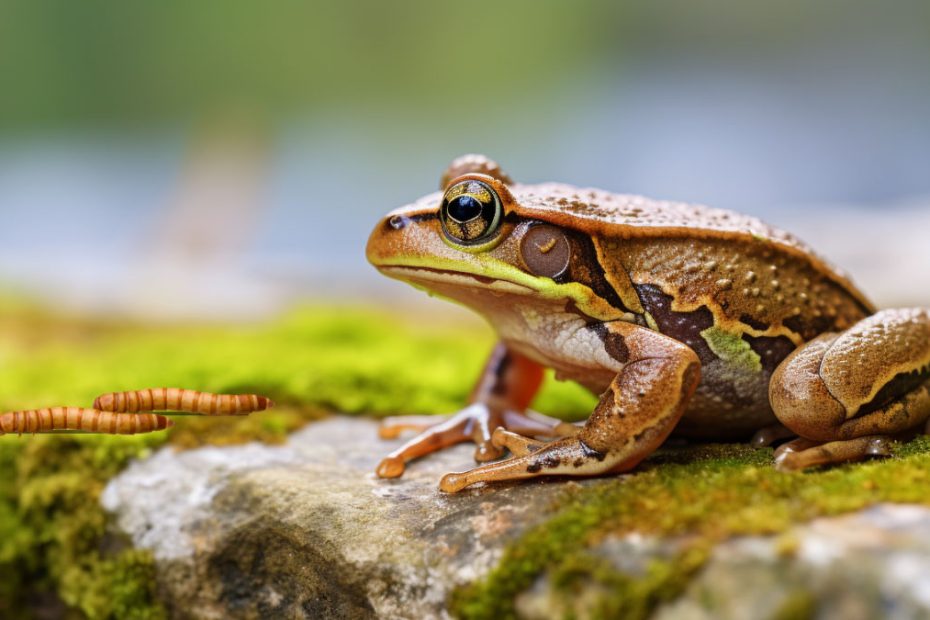As an Amphibian, frogs always love to eat such tiny creatures that are easy to catch and highly beneficial for their health. In this case, worms are not only rich in nutrients, but also easy to prey on.
Here, you may ask, do frogs eat worms? The simple answer is “YES”. Frogs eat almost all types of worms, like earthworms, superworms, waxworms, nightcrawlers, etc. Usually, frogs are one of the primary predators of worms, and they serve as a vital source of nutrition for frogs.
But, if you want to feed your frogs or want to know more about their food habits, then this information mightn’t be enough. So, continue reading to learn more.
Do Frogs Eat Worms? A Detailed Explanation
Yes, they eat worms. In fact, in both the wild and captivity situations, worms serve as an important source of food for most frogs. These worms are not only easy to find but also contain a significant amount of nutritional substances.
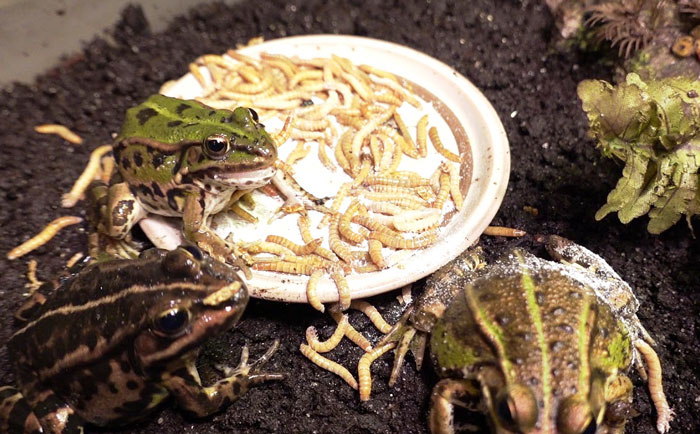
However, not all worms are equally nutritious or suitable for frogs, and not all frog species eat worms. The following is a detailed explanation of this.
What Type Of Worms Do Frogs Usually Eat?
Though frogs can eat a variety of worms, they do not eat all types of worm species. According to Britannica, there are around 20,000 species of worms known in our world. They are not all related and look quite different from each other.
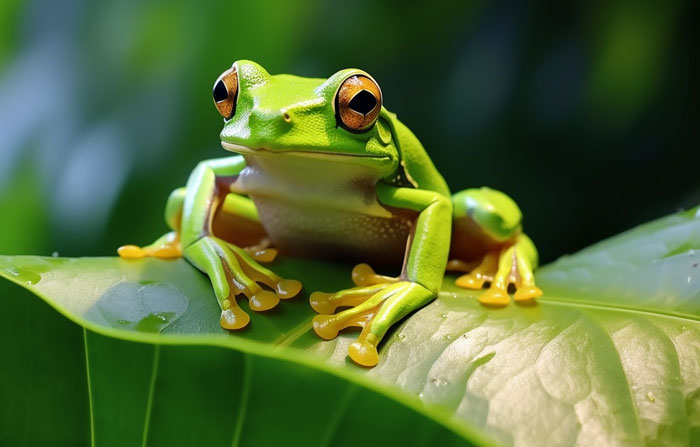
Here are some names of worms that frogs usually eat and are beneficial for their health.
- Mealworms
- Redworms
- Nightcrawlers
- Earthworms
- Waxworms
- Superworms
- Hornworms
- Silkworms
- Freeze Dried
- Bloodworms
- Butterworms
- Phoenix Worms
At Which Stage Of Their Life Do Frogs Usually Eat Worms?
Generally, from birth to death, every frog passes through 4 different stages of life.
They are:
- Stage 1: Egg
- Stage 2: Tadpole
- Stage 3: Froglet (young frog)
- Stage 4: Adult frog
In each of these stages, there are differences in their size, shape, behavior, and movement. Also, they eat different kinds and sizes of food.
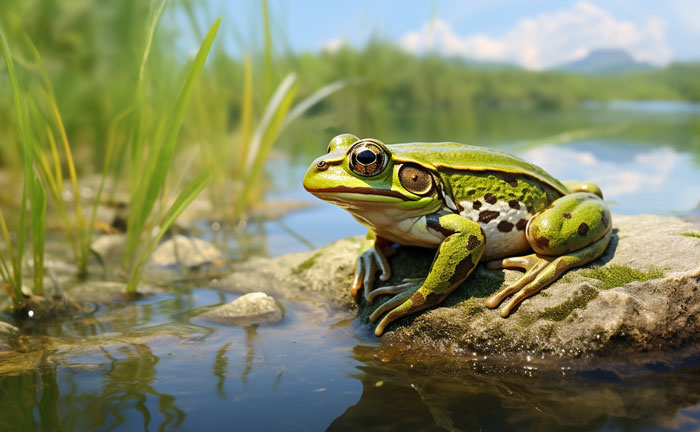
Usually, frogs start eating worms from their Froglet stage. At this time, they are young and eat various kinds of small insects and worms. But, they avoid any large worms.
Then, after 2-4 years of the Froglet (young) stage, they turn into Adult frogs. At this time, their jaws and digestive systems adapt to a carnivorous diet. This allows them to capture and consume worms, insects, and other small animals.
Here is a list of what fully-grown frogs eat. You’ll find they not only eat worms but also other insects or small creatures.
| Crickets | Aquatic invertebrates | Amphibian Larvae |
| Worms | Fish | Small Mammals |
| Locusts | Crustaceans | Snails |
| Grasshoppers | Algae | Mollusks |
| Caterpillars | Small fishes | Rodents |
| Shrimp | Spiders | Black soldier flies |
| Small mice | Reptiles | Fruit flies |
| Dubia roaches | Mollusks | Insects |
Which Worms Should I Avoid For My Captive Frog And Why?
In general, because of limited prey variety, moving area, and controlled environment, a captive frog’s food habits are quite different from a wild frog. That’s why not all types of worms are suitable for captive frogs.
Also, different species of frogs need specific dietary requirements. So, it’s essential to research the specific needs of your frog species.
Here are a few types of worms that you should avoid feeding to your captive frog:
Red Wigglers (Eisenia fetida)
They produce an unpleasant smell and are toxic to certain amphibians, which can cause illness or death to your frogs.
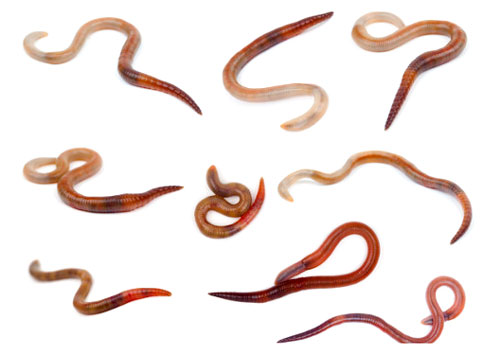
Large Worms
Since frogs mostly swallow their prey, if the worm is too big, it can get stuck in their throat or intestines. This can cause choking, injury, or indigestion issues.
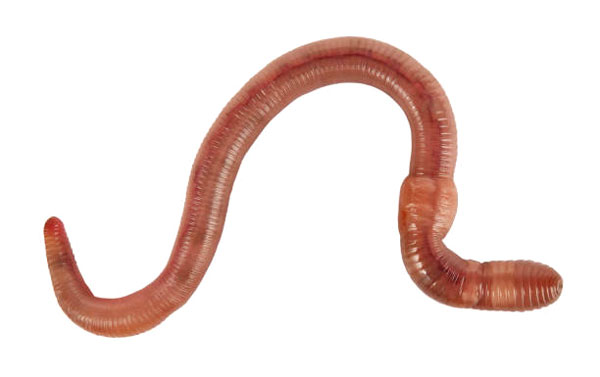
Wild Worms/Earthworms
These types of worms live in soils and often contain toxic chemicals, parasites, herbicides, and pesticides. This can infect or kill your frog.
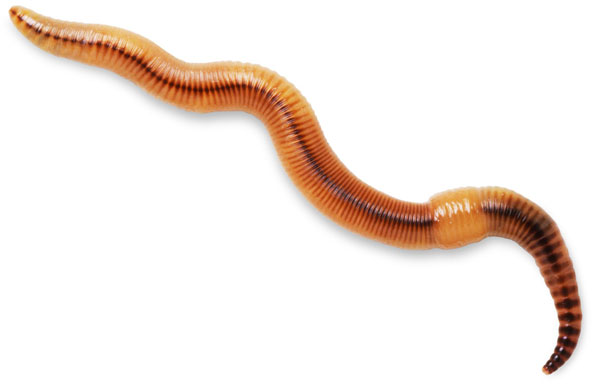
Mealworms
Mealworms contain a lot of Chitin. This can be difficult for frogs to digest in large quantities and can cause impaction.
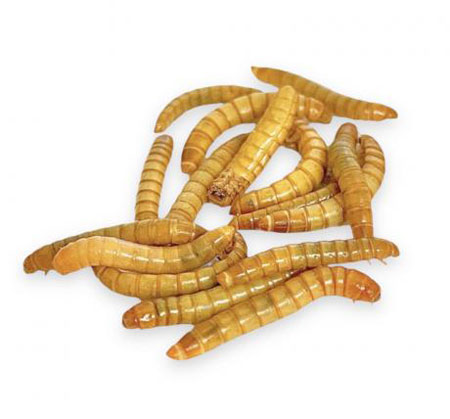
Waxworms
They contain a significant amount of fat which can create frog digestive problems (like constipation). That’s why you shouldn’t feed your frogs, only the waxworms.
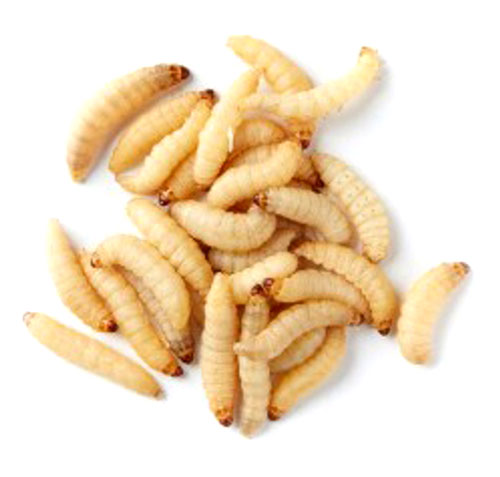
Superworms
These types of worms are hard for frogs to digest. Moreover, they can cause a prolapse by consuming the insides of the frog.
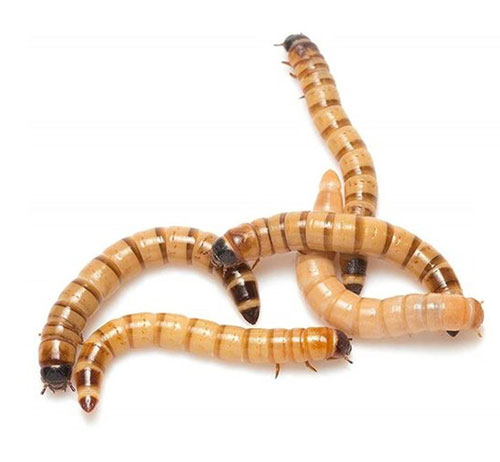
Dead worms
These worms mostly contain parasites or disease organisms that could badly affect your frog’s health and cause it to die. Besides, they aren’t as nutritious as live worms.
How Many Worms Does A Frog Eat Every Day?
The quantity of worms a frog eats each day totally depends on their age, size, activity level, and species. Usually, in wild nature, a healthy frog eats around 7 to 15 worms each day. However, this number is not applicable to all frog species.
Here, BBEVS suggests that you should feed a young frog once a day and around 6-7 days a week. But, for the adult frog, you should feed them after every 2-3 days and around 7 to 10 worms at a time.
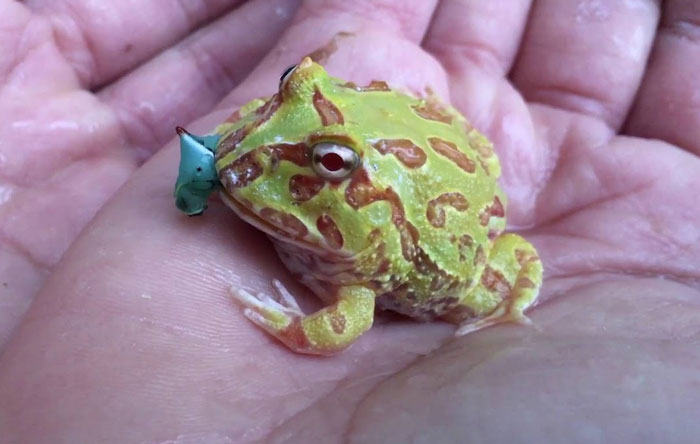
However, it is generally recommended that you first give 2 to 3 mealworms for each frog. If they immediately eat all of them and look hungry, then you can increase the worm’s amount. But, if they don’t eat all of them, then from next, decrease the amount of worms.
Remember, you shouldn’t overfeed your frog, and the worms shouldn’t be longer than ⅓ of the frog’s body.
Nutritional Value Of Worms For Frogs
The specific nutritional value of worms fully depends on their species. But generally, they are considered a good source of protein, micronutrients (like iron and zinc), fat, calcium, and vitamins (A and E).
Worms are also high in manganese, amino acids (including lysine and methionine), and copper.
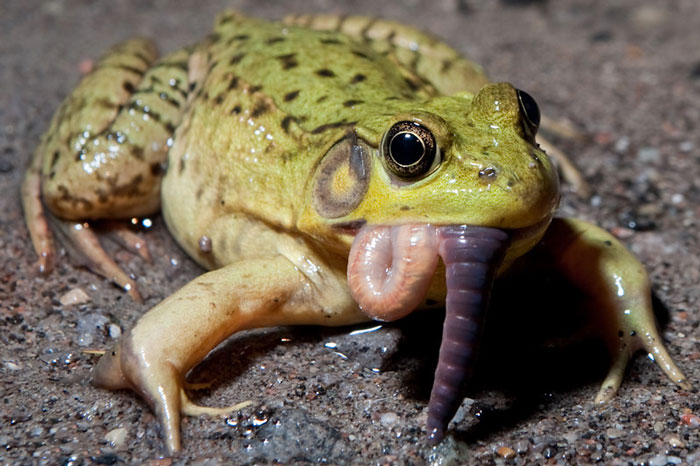
As an example,
Earthworms contain
| Substance (dry matter) | Amount (%) |
| Protein | 60-70% |
| Fat | 6-11% |
| carbohydrates | 5-21% |
| Minerals and other vitamins,including niacin | 2-3% |
Superworms contain
| Substance | Amount (%) |
| Moisture | 57.9% |
| Fat | 17.7% |
| Fiber | 2.7% |
| Ash | 1.0% |
| Protein | 19.7% |
| Phosphorus | 2370 mg/kg |
| Calcium | 177 mg/kg |
These help the frogs to grow, repair their tissues, and support their immune system, vision, skin, bones, blood, and metabolism.
Can A Frog Survive Its Entire Life By Eating Only Worms?
No. Because to stay healthy and thrive, frogs need several types of nutrients, vitamins, and protein. But only worms can’t fulfill these requirements. Worms can just be a part of their diet, and they can’t be the only food source.
Frogs always need to eat different insects, spiders, and other small animals to acquire the vitamins and minerals they need.
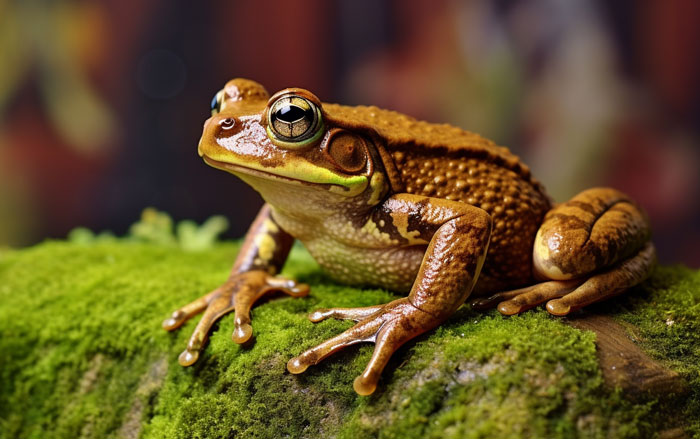
Is There Enough Worms For Frogs To Eat?
Unfortunately, NO.
Due to the heavy use of chemical fertilizers, pesticides, etc., the number of worms is decreasing alarmingly. As a result, frogs are continuously losing their primary food source. That’s why their numbers are also decreasing.
Though now it seems like a minor issue, if it continues, then very soon our natural ecosystem will fall apart. So, we should try our best to protect these worms and frog populations.
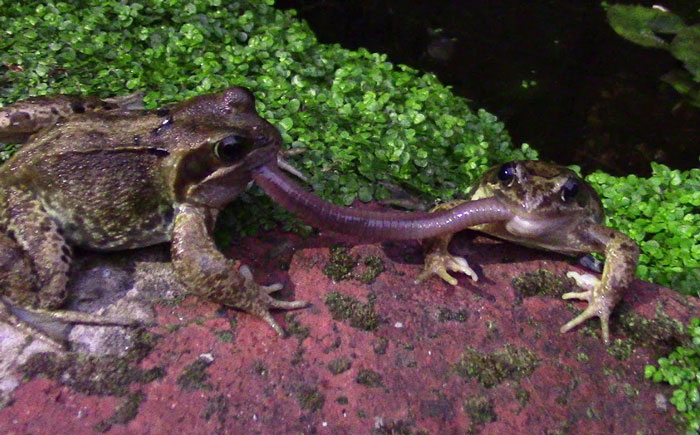
FAQs
You might have gotten all the necessary information you were looking for. But still, there might be some unanswered questions in your mind. Don’t worry! This FAQ section will also cover those.
To feed worms to your frogs, select the right worms (dry or alive) and give the right amount (mentioned above). But, if the worms are too large, then before giving, cut them into smaller pieces.
Yes, frogs typically eat dried worms. But, sometimes, these dry worms contain harmful bacteria or toxic parasites that can be harmful to a frog. So it’s better to avoid these and always try to give them live food.
Yes, you can. But sometimes people use pesticides or fertilizers in their gardens. So if you do the same, then you shouldn’t give these garden worms to your frogs. Because worms absorb these chemicals from the soil, and it later makes your frog sick.
Final Verdict
After all, you came to know why frogs eat worms and how these worms are beneficial for frogs. Actually, frogs are fascinating animals that belong to the Amphibia class. They eat a wide variety of prey and even other frogs.
But, they mostly love to eat worms because they can get them easily without working too hard. However, if you pet any frogs, then you should be careful about feeding them.

Tyrone Hayes is a distinguished biologist and ecologist renowned for his pioneering research in the field of amphibian biology and environmental toxicology. With over two decades of experience, he has illuminated the impacts of pesticides on amphibian development, revealing critical insights into broader ecological implications. Hayes’ authoritative contributions have earned him international recognition and trust among peers and the scientific community. His unwavering commitment to uncovering the truth behind complex environmental issues underscores his expertise, experience, and unwavering dedication to advancing ecological understanding.
